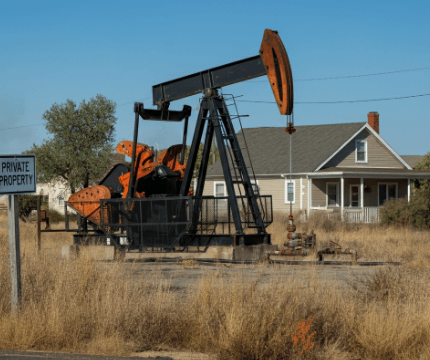What are mineral rights? If you own land, you might be surprised to learn that you don’t always own what’s beneath the surface. Mineral rights refer to the ownership of valuable resources, such as oil, gas, coal, or metals, that are found underground. In the U.S., mineral rights can be worth millions, with the oil and gas industry alone contributing over $1.7 trillion to the economy annually. Understanding “What are mineral rights?” and how they work is crucial, especially if you’re considering selling land or tapping into its hidden value. Steve Daria and Joleigh, renowned real estate investors and cash land buyers, have helped countless property owners unlock the potential of their land. Whether you’re curious about selling your mineral rights or need guidance on their legal and financial implications, they’re here to help. Don’t leave money buried beneath your property! Schedule a free discussion with Steve and Joleigh today to uncover your options and gain valuable insights into the true value of your land.
What are mineral rights, and why are they important?
Mineral rights grant ownership of the natural resources located beneath a property’s surface, including oil, gas, coal, metals, and other valuable materials.
These rights enable the owner to explore, extract, or sell these resources, often resulting in substantial financial benefits.
For example, if oil or gas is discovered on your land, owning the mineral rights means you could profit from its extraction.
Mineral rights are important because they can add substantial value to a property, sometimes even exceeding the value of the land itself.

They also give the owner control over how the resources are used or sold, which can be a critical factor in long-term financial planning.
However, not all landowners automatically own the mineral rights to their property, as these rights can be sold or leased separately.
Understanding what mineral rights are is essential for making informed decisions about your property.
Whether you plan to sell, lease, or retain them, knowing their value and legal implications can help you maximize your land’s potential.
Get Started: Get Your Cash Offer Below…
We are direct land buyers. There are no commissions or fees and no obligation whatsoever. Start below by sharing where your property is and where we can send your offer…
Can I own land without owning the mineral rights?
Yes, it’s possible to own the surface of a property while someone else owns the mineral rights beneath it.
In many cases, mineral rights are sold or leased separately from the land itself, meaning the surface owner may not have control over the resources underground.
This is common in areas where valuable resources, such as oil, gas, or minerals, are present.
If you don’t own the mineral rights, the rights holder may have the legal authority to access your land to extract those resources.
This can sometimes lead to disruptions, such as drilling or mining activities, even if you own the surface.
It’s important to check property records or consult a professional to determine whether you own the mineral rights to your land.
Understanding “What are mineral rights?” is crucial when buying or selling property, as it can significantly impact the land’s value and usage.
Knowing who owns the mineral rights ensures that you’re fully informed about your property’s potential and any associated legal implications.
How can I find out if I own the mineral rights to my property?
- Check Your Property Deed: Begin by reviewing your property deed, as it typically includes information about mineral rights. It may state whether the mineral rights were sold, retained, or transferred by a previous owner.
- Understanding Mineral Rights: Mineral rights refer to the ownership of resources, such as oil, gas, or minerals, located beneath the surface. Knowing “What are mineral rights?” can help you figure out if they were separated from your land ownership in the past.
- Search Public Records at Your Local Office: Visit your county clerk or recorder’s office to access public records of property transactions. These records can show if mineral rights were sold or transferred by a previous owner.
- Consult a Professional Title Company or Real Estate Attorney to Understand Mineral Rights: They can help clarify the question, “What are mineral rights?” and determine whether you hold ownership of them. They can clarify legal terms and past transactions that could impact your ownership.
- Request a Title Search: A title search is a detailed review of your property’s ownership history. This process can confirm if you own the mineral rights or if they belong to someone else.

What factors affect the value of mineral rights?
Several key factors determine the value of mineral rights.
The type of resources available, such as oil, gas, coal, or precious metals, plays a major role in their value.
For example, oil and gas deposits are often more valuable than other minerals due to high demand.
The location of the property is another key factor, as areas with proven resource deposits or active drilling operations tend to attract more interest and higher offers.
Market conditions, like the current prices of oil, gas, or other minerals, can also significantly impact the value of mineral rights.
When prices are high, the value of mineral rights typically increases.
Whether the mineral rights are leased or unleased is another consideration.
Leased mineral rights often have a higher value because they are already generating income or have agreements in place for future extraction.
The size of the property and the estimated amount of resources it holds also influence its worth.
Legal or environmental restrictions, such as zoning laws or protected areas, can limit resource extraction and lower the value.
Understanding “What are mineral rights?” is crucial to accurately assessing their worth and making informed decisions about selling, leasing, or retaining them.
What are the risks of keeping mineral rights versus selling them?
- Changing Market Conditions: The value of mineral rights depends on market conditions, like the price of oil or gas. If you hold onto them, you risk retaining an asset that could lose value if the market declines.
- Understanding What Mineral Rights Are: If you don’t fully understand “What are mineral rights?”, you might face challenges in managing them. This may result in missed opportunities or unforeseen legal and financial challenges.
- Environmental Risks: Holding mineral rights means you may be exposed to environmental risks if resources are extracted. Drilling or mining can cause damage to your land, which may lower its surface value or lead to disputes.
- Legal and Tax Issues Related to Mineral Rights Ownership: Owning mineral rights can entail significant legal and tax responsibilities. If you don’t understand “What are mineral rights?” and their obligations, these costs could become overwhelming.
- Missed Financial Gains: By keeping your mineral rights, you might miss the chance to sell them when their value is high. Selling could provide immediate financial benefits, while holding onto them carries the risk of future uncertainty.
How do I evaluate the financial benefits of selling mineral rights?
Begin by assessing the market value of the resources beneath your property, such as oil, gas, or minerals, to gain a clear understanding of their current worth.
Factors such as resource type, market demand, and the location of your property play a significant role in determining their value.
If your mineral rights are leased, they may already generate income, which can increase their value.
Unleased rights, while not producing income, may still hold significant potential depending on market trends.
Another important consideration is the long-term potential of the resources.
If the market value of oil or gas is expected to increase, holding onto your mineral rights could result in greater profits in the future.
However, selling them now provides immediate financial benefits, which can be used to pay off debts, invest, or achieve other financial goals.
Understanding the question, “What are mineral rights?” is crucial to making an informed decision.
Consulting a professional, such as a real estate attorney or mineral rights appraiser, can help you assess the true value and risks.
If you’re thinking about selling, take the time to weigh the pros and cons.
Contact an expert today to ensure you’re making the best financial choice for your future.
Takeaway
- Definition of Mineral Rights: Mineral rights refer to the ownership of resources, such as oil, gas, coal, or other minerals, that are located beneath the surface of a property. These rights can be sold, leased, or retained separately from the land itself.
- Understanding What Mineral Rights Are: Knowing “What are mineral rights?” is essential for property owners to determine if they own the resources under their land. Without this understanding, you might miss opportunities or face legal and financial challenges.
- The Value of Mineral Rights: This is influenced by several key factors, including the type of resources available, market demand, and the location of the property. Leased mineral rights often have higher value because they generate income or have agreements in place for extraction.
- Legal Implications of Ownership: Owning mineral rights entails legal responsibilities, including tax obligations and compliance with environmental laws. It’s important to understand these obligations to avoid unexpected costs or disputes.
- Making Informed Decisions: Whether you keep, sell, or lease your mineral rights, it’s crucial to evaluate the financial and legal aspects. Consulting a professional can help you make the best decision for your situation.
**NOTICE: Please note that the content presented in this post is intended solely for informational and educational purposes. It should not be construed as legal or financial advice or relied upon as a replacement for consultation with a qualified attorney or CPA. For specific guidance on legal or financial matters, readers are encouraged to seek professional assistance from an attorney, CPA, or other appropriate professional regarding the subject matter.
